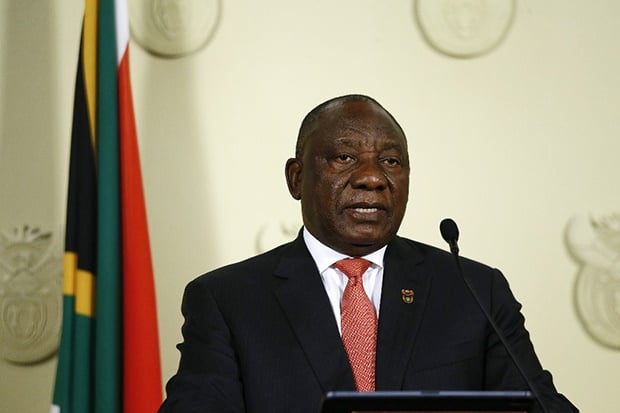
President Cyril Ramaphosa has announced a 21-day lockdown as fears mount that thousands have already been infected by the Covid-19 coronavirus.
This comes in the wake of reports by the Department of Health that about 402 people across the country have tested positive for Covid-19.
Ramaphosa said the lockdown would begin at midnight on Thursday 26 March.
A PowerPoint presentation circulating on instant messaging app Whatsapp shows that authorities are worried that should they fail to arrest the virus from spreading, it could infect as many as one million people within a few weeks.
The document, allegedly authored by President Cyril Ramaphosa’s social policy advisor Professor Olive Shisana, shows that the aim of the lockdown was to reduce interaction between infected and uninfected people in order to “flatten the curve” of new infections.
The document – a short summary of government’s response to the epidemic – details how the government plans to contain the spread of Covid-19 in the coming days and weeks.
The lockdown will result in individuals, except essential personnel such as doctors, nurses, the police and other health workers, being restricted from leaving their homes, says the document.
The document shows government’s aim “to implement a 21 day “stay-at-home” whole-country lockdown, where only absolutely essential personnel (such as doctors, nurses, police, etc) and those requiring medical care will be allowed to leave home for restricted periods. Individuals will not be allowed to leave their homes except under strictly controlled circumstances. For the homeless, either their existing locations or, where available, alternative temporary accommodation sites, will be used for their 21-day “stay-at-home” period. During this period, clinics, pharmacies, food-stores and hospitals will remain open,” reads the PowerPoint presentation.
“The continued spread of the coronavirus SARS-Cov-2 is a major concern as the country only has a short window of opportunity to “flatten the curve” prior to the inflection point, by reducing interactions between infected and uninfected people. The goal is to control the spread of Covid-19 through steps to “test the susceptible population, quarantine the suspected cases and offer treatment to the infected and confirmed, as well as block the transmission route in the shortest time and limited space,” reads the document.
The lockdown will see the relaxation of criteria of who can be tested and an exponential increase in testing capacity in laboratories across the country.
Until now testing has been restricted to people who have travelled overseas and individuals who may have come in contact with people who travelled overseas.
The shutdown will allow authorities to “identify as many cases as possible, SARS-CoV-2 testing will be made widely available and the criteria for a test will be relaxed, with commensurate increasing laboratory capacity”, says the document.
The document shows that government will shut down a number of public transport modes in an effort to control the movement of people.
Authorities will also intensify the collection of data of the number of tests performed and the identification of cases in order to identify hotspots and zoom in on therm.
The government’s strategy, the document shows, has drawn lessons from how countries such as China, Singapore, South Korea and Italy handled the outbreak of Covid-19.
“Valuable lessons are being learnt from the experiences of each country dealing with the Covid-19 epidemic and some trends are emerging including nine essential lessons on fighting coronavirus from around the world. One of the most significant lessons to be learnt from the experiences of China and Italy is that the coronavirus epidemic can grow very rapidly and quickly overwhelm healthcare services leading to large number of avoidable deaths. Singapore and South Korea were able to avoid this situation by interventions that “flattened the curve” ie. mitigated the exponential growth phase of the epidemic so that the healthcare service was able to cope with the demand for medical care, especially ventilators,” reads the document.
According to the World Health Organisation (WHO) close to 367 000 infections have been confirmed in more than 190 territories across the world.
Of those, 16 102 people have died.
Full statement: Ramaphosa announces 21-day lockdown by CityPress on Scribd




 Publications
Publications
 Partners
Partners








